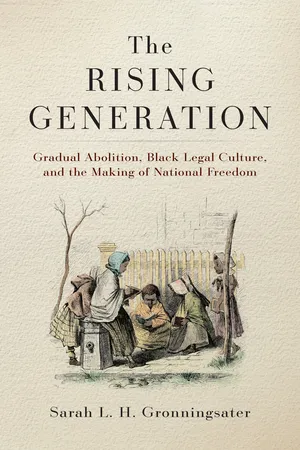
Early American Studies
Black Legal Culture and the Origins of National Freedom
- 432 pages
- English
- ePUB (mobile friendly)
- Only available on web
Early American Studies
Black Legal Culture and the Origins of National Freedom
About This Book
Chronicles the history of emancipation through the cradle-to-grave experiences of a remarkable generation of black northerners The Rising Generation chronicles the long history of emancipation in the United States through the cradle-to-grave experiences of a generation of black New Yorkers. Born into precarious freedom after the American Revolution and reaching adulthood in the lead-up to the Civil War, this remarkable generation ultimately played an outsized role in political and legal conflicts over slavery's future, influencing both the nation's path to the Civil War and changes to the US Constitution.Through exhaustive research in archives across New York State, where the largest enslaved population in the North resided at the time of the American Revolution, Sarah L. H. Gronningsater begins by exploring how English colonial laws shaped late eighteenth-century gradual abolition acts that freed children born to enslaved mothers. The boys and girls affected by these laws were born into a quasi-free legal status. They were technically not enslaved but were nonetheless required to labor as servants until they reached adulthood. Parents, teachers, and mentors of these "children of gradual abolition" found multiple ways to protect and nurture the boys and girls in their midst. They supported and founded schools, formed ties with white lawyers and abolitionists, petitioned local and state officials for better laws, guarded against kidnapping and cruelty, and shaped New York's evolving identity as a free state. Black fathers used their votes during annual state elections in the early 1800s to influence legislative antislavery efforts. After many but not all black men in the state were disfranchised by a race-based property requirement in 1822, black citizens across New York organized to regain equal suffrage and to expand and protect other crucial, non-gendered features of state citizenship. Women and children were critical participants in these efforts.Gronningsater shows how, as the children of gradual abolition reached adulthood, they took the lessons of their youth into midcentury campaigns for legal equality, political inclusion, equitable common school education, and the expansion of freedom across the nation.
Frequently asked questions
Information
Table of contents
- Cover
- Half Title
- Series Page
- Title Page
- Copyright
- Dedication
- Epigraph
- Contents
- Introduction. “Emancipate, Enfranchise, Educate”
- Chapter 1. Poor Law, Slave Law, and the Golden Rule: Quaker Antislavery and the Early Modern Origins of Gradual Abolition Policy
- Chapter 2. “To Be Born Free” . . . and Bound: The 1799 Gradual Abolition Law and Its Consequences
- Chapter 3. Educating the “Rising Generation”: Associational Culture and the Politics of Black Schools
- Chapter 4. Citizenship National: Slavery, Democracy, and Black Citizenship in the 1820s
- Chapter 5. Male and Female “Citizens of the State”: Rights, Politics, Petitions, and Parties
- Chapter 6. Antislavery Legal Culture: The Lemmon Slave Case and the Coming of the Civil War
- Chapter 7. The Great Question of Equality Before the Law: The Civil War and Reconstruction
- Epilogue. The Two Charlottes
- List of Abbreviations
- Notes
- Index
- Acknowledgments